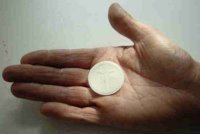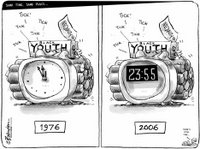Resurrection - tall order or rising high?
I ended my last piece on “hell 2” with the question that that piece begs: “What about resurrection?” I also said a while back that I would have appreciated someone in my life to give me straight answers. One of the reasons people may have hesitated is that a straight answer often begets more questions. But here goes…
I believe in resurrection, but I don’t believe in life-after-death in the conventional sense of my sense-of-self continuing after I die.
Resurrection is the idea that death cannot contain a person who has truly lived to the full. There is more to the idea than just that, but at the very least, everyone understands it thus far and I think almost anyone can agree to that. People whose lives have been touched by someone who has died continue to hold that person in their memory. The more fully that life was lived, the greater the reverence for their memory both in quantity of people (fame) and quality (authority?).
Going further requires a belief system that I have long since come to doubt. This is not to say I have dismissed it entirely…
The Christian idea of Resurrection is that one day all believers will be bodily and spiritually reassembled to live together for eternity. I have already expressed my doubts about an eternal life-after-death so I won’t go into that here.
Just as science has helped us to see that St. Paul and co had the wrong idea about how the universe is arranged, I believe science is unravelling the substance of physical resurrection. St Paul assumed a three-tiered arrangement of the universe: an underworld of spirits or hell; the earth (flat); and heaven above. He was wrong about that. St Paul also believed in a resurrection of all souls who believed in Jesus, something he thought would happen very soon – even in his lifetime. He was wrong about the timing and I think he was wrong about the bodily resurrection.
But I won’t go into the historical debate here. I think this quote says it all:
"The truth of the Resurrection shouldn't be the real battleground. I think what we want to do is try and rise above that and ask, 'What is the metaphoric truth of Easter?' The real power of Easter is the transformation that, as Christians, we believe continues to happen in people's lives....If Easter is about proving the veracity of some historical event that happened 2,000 years ago, that misses the point." Rev. Steve Huber of St. Columba's Episcopal Church
That about sums it up for me. (You can read more at Religious Tolerance.)
St Paul may have been wrong about the three-tiered universe – a forgivable shortsightedness given that he didn’t have a telescope. But that doesn’t stop us looking heavenward when we pray. Why? Because it is a helpful idea to imagine God and heaven as larger than us – above us – beyond us: God draws us toward an ideal. The metaphor has survived scientific scepticism. I have the same orientation toward the Resurrection. The story of Jesus’ rising from the dead is a powerful metaphor of his new Body in the form of those who choose to follow him and continue his memory in their own lives and commitments. If I doubt the historical validity of the Resurrection that does not impinge on that metaphor and therefore my belief is the more powerful.
I also think that believing in a metaphorical resurrection is more consistent with the idea of Incarnation: God becoming human. When I say, “Jesus lives!” I am declaring that Jesus’ teachings, values and power are real, present and available right in front of me by virtue of the activities of those who follow him.
"For the Son of God became man so that we might become God" Athanasios the Great, Archbishop of Alexandria
Resurrection draws us toward the divine ideal of a fully alive human being who transcends death by virtue of the power of their ideas, commitments, actions, values, teachings and so on.
I am more than merely a “skin-encapsulated ego”. Resurrection is something that begins even before death as my values, ideas, memories, loves infect the people around me. Resurrection is most apparent at funerals where people avoid the bad stuff, preferring to highlight the good. This is not always a bad thing, or at least we should acknowledge that to reconcile ourselves to a person’s mistakes begins the work of resurrecting their life and honouring their memory.




















